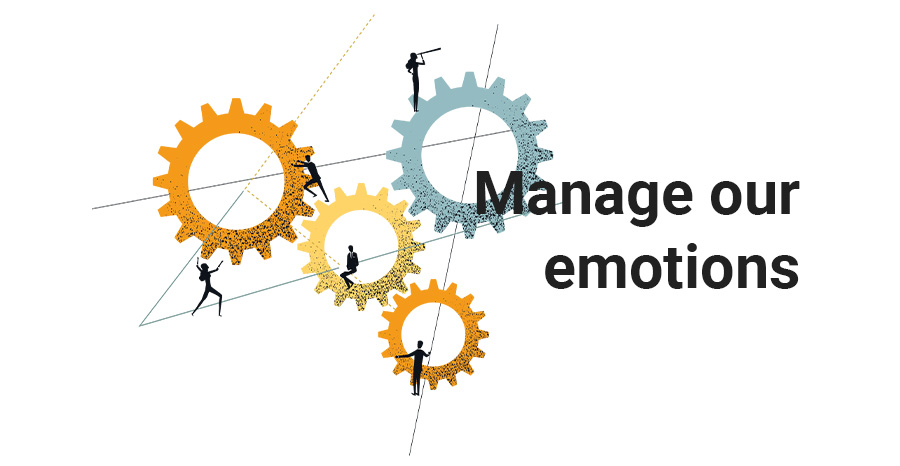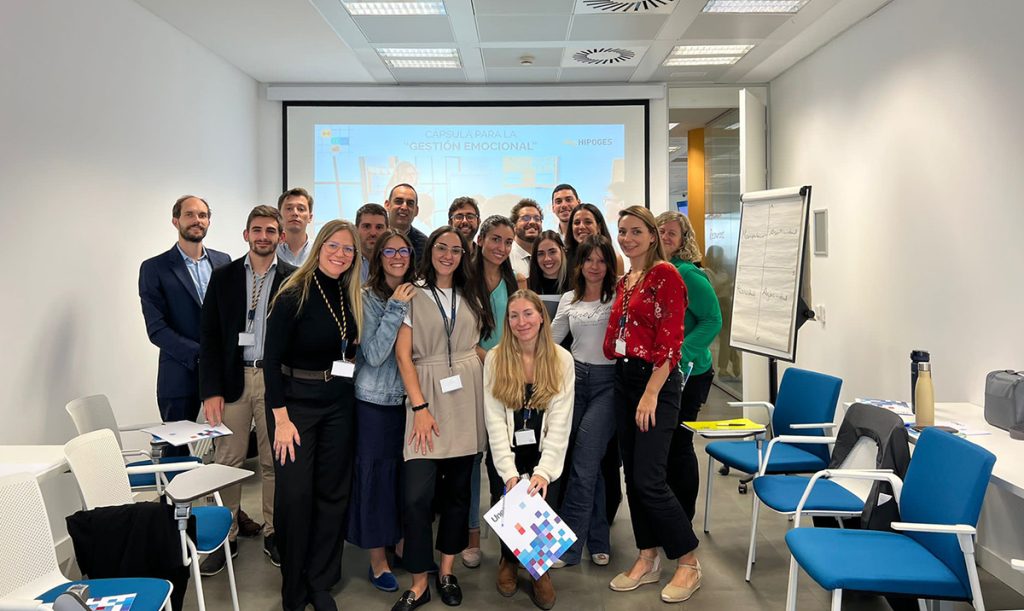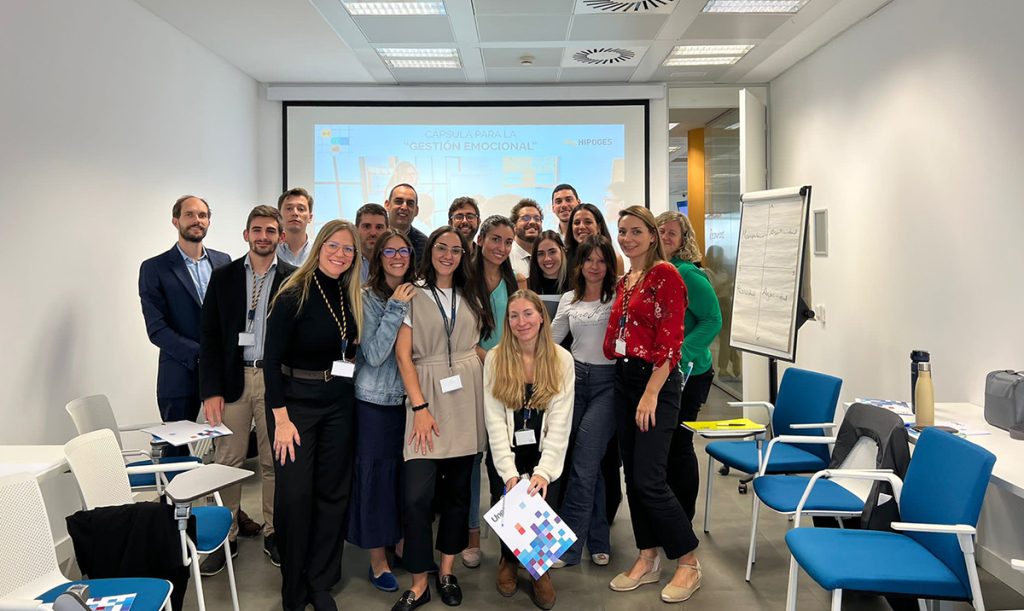During the month of October, several training sessions were held at Hipoges’ Madrid and Valencia headquarters, during these sessions, aspects of “Emotional Management” were worked on. This initiative, lead by the Human Resources department after a research of needs amongst employees, the main objective was to facilitate everyone to develop and enhance their emotional intelligence and thus be more effective on a daily basis.
The workshops on emotional management were held in person on the 2nd, 3rd, 5th and 16th of October, in the Madrid office and on the 17th of the same month at the Valencia office. During these days over 70 people from the Hipoges family were able to benefit from these enriching training sessions across 5-hour sessions.
But what is emotional management? Is it linked to mental health? The answer is clearly yes. Emotional management is about knowing how to manage the various emotional reactions and feelings that people can experience in different situations. These reactions that can overcome us, are to be expected in difficult times, they are responses that, although uncomfortable, are derived from a crisis situation. Therefore, it is very important that they are not interpreted as a sign of weakness.

How were the Emotional Management sessions at Hipoges?
The sessions were carried out through the Une Consultores en Personas approach, guided by a methodology and lines of content that provide answers to the needs raised by the company. Thus, 3 objectives were set as guidelines for the sessions:
1. Reinforce: generate learning spaces in which the people of Hipoges can enhance their development in the emotional management skills that can ease their daily lives.
2. Develop: offer concrete tools to manage your emotions and mood and be able to manage personal interactions with clients and colleagues more efficiently.
3. Reconnect: reinforce the motivation and commitment of all people, and thus achieve excellence in performance.
In short, make it easier for people to develop and enhance their emotional intelligence and be more effective.
The importance of Emotional Management is crucial for the company. In the words of Juan Neble, Director of Human Resources for Spain, “emotional management at Hipoges plays a crucial role in generating a healthy and productive work environment. For the company, emotional management is essential in building effective relationships at work. Leaders who understand and respect the emotions of their colleagues tend to generate an environment of trust and collaboration. This encourages open communication, motivation and loyalty among people on the team, resulting in increased cohesion and efficiency. Finally, emotional management is essential for retaining Hipoges talent.
In summary, emotional management at Hipoges not only benefits everyone in the company, but also strengthens organizational health and the achievement of our long-term strategic objectives.”
The content of the training sessions was organised in three blocks. The first block dealt with emotions, knowing what they are and recognizing the “emotional kit”. This was followed by a more in-depth analysis of day-to-day life, knowing what assertiveness and communication skills are. Subsequently, the limits and regulation of emotions was discussed, while the last part focused on beliefs, applying everything seen previously through different tools, integration of learning, and the design of an individual action plan.
At the end of the training content blocks there was a “Speed feedback” time to share opinions and comments with the rest of the colleagues.

Feedback and testimonials after the Emotional Management training sessions
The general feedback from the Emotional Management training sessions was very positive, also thanks to the great professional Ainara Rivas, Consultant and Project Coordinator at Une Consultores en Personas. In the words of a person who attended one of the sessions:
“The emotional management session was very useful to me. Ainara made the training very dynamic. Based on the fact that in general, the population does not have much knowledge about mental health, the trainer provided down-to-earth explanations so that anyone could understand them. The engagement on the session was great.
There is nothing as important as knowing yourself, identifying what emotions we are feeling and not being afraid to feel them. Since both within the work environment and in our daily lives, having emotional management tools makes it easier for us to prevent and manage the possible discomfort that we may feel at certain points in our lives.
The importance of communication was also addressed within the session. In particular, assertive communication, an essential tool to communicate appropriately with the people around us. Being able to express our limits and needs in a polite and direct way.
I hope we can access more training focused on mental health in the future. Because it is as important to take care of ourselves as it is to know how to support and care for the people around us (family, work, friends, partner…).
Thank you very much for this nice proposal.”
Joaquín Garcia, Accountant of the Corporate Services Department in Madrid also wanted to leave a comment:
“In my humble opinion, both the way Ainara, the psychologist managed the session, and the tests, exchanges of opinions, etc… were exceptional.
In general, it was a success to have been invited to such a session because it opened my eyes more to the management of emotions, as well as the attendees of the session who commented that they came without any expectations. And yet when we left the session we all left with a very positive feeling of what we were able to discuss in the session.
I highly recommend this type of sessions to all employees, regardless of their position, we are people and from time to time we need this type of sessions.”
Pepe Soriano, Middle Office Manager Junior of the department of Support Operations from the Valencia office, also wanted to leave some words of appreciation:
“I found the course really useful, that’s how I would define it, USEFUL. In the end it is really important to know how to manage ourselves, to know that there are times when we have to stop and think about how we act and the reason why we act that way. I totally recommend it, not only on a professional level, but also on a personal level.”

